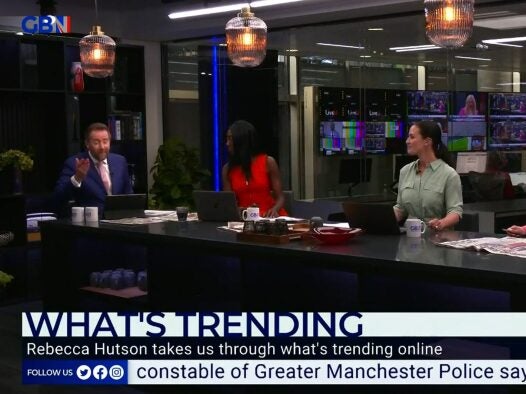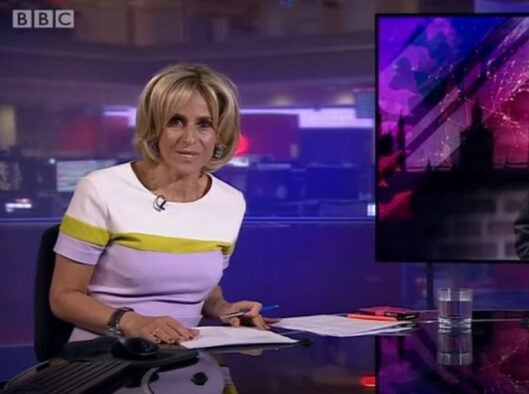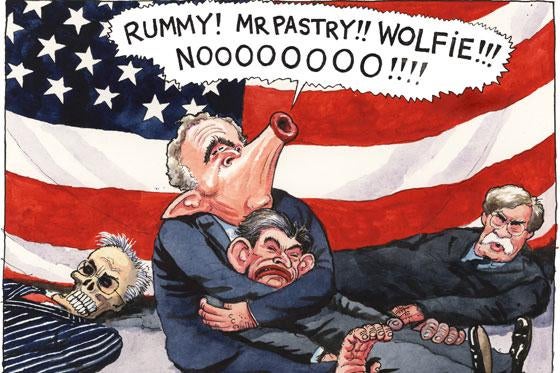
Press Gazette rounds up the biggest media stories of 2021, ranking them in order of their popularity on our website.
1. Launch of GB News – and ensuing drama

GB News at launch
Several of our most-read stories in 2021 were about GB News – before launch, people were interested in everything to do with the new channel from its presenters, its financial backers, and the number of jobs it had on offer.
Then, after launch, interest turned to an advertising boycott that began within 48 hours. We made efforts to keep track of every brand that was distancing itself from GB News – and why they were doing so.
Our biggest story of the year (excluding the regularly updated GB News anchor page and national newspaper ABCs) was an exclusive look at the broadcaster’s first month digital growth as it insisted TV viewing figures were not the be-all and end-all.
The story kept momentum as chairman and lead presenter Andrew Neil quit after just two weeks on air and later stoked a very public row with his ex-employer. Former UKIP leader Nigel Farage joined the broadcaster in July, and it has just announced plans to simulcast on DAB radio from January.
GB News says it is seeing ‘incredible trajectory’ online as 3.7m tuned in over first month
2. Twitter row gets Telegraph cartoonist canned
Press Gazette broke the news in September that Telegraph cartoonist Bob had been suspended over Twitter posts he made targeting an NHS doctor amid a row about wearing masks on public transport to stop the spread of Covid-19. He was later fired.
Moran said: “I want to make it clear that I did not target Dr Clarke in any capacity as a journalist or as an employee of Telegraph Media Group. I targeted her in my capacity as a desperate and angry father of a disabled child.”
The story showed the risks of getting carried away on Twitter – especially for employees of media organisations that, like it or not, represent their publisher.
Telegraph sacks cartoonist Bob Moran over Twitter posts targeting NHS doctor
3. Accusations of Covid ‘censorship’
In July we heard from a group of journalists with concerns they believed had not been heard within the industry since the start of the pandemic – and we felt it would be of interest to our readers to highlight these counter views.
They claimed that attempts to share concerns counter to the “one official narrative” or “one ‘scientific truth’” about Covid-19 had led to reporters being criticised by their managers, freelances being blacklisted, and the public receiving a “distorted view of the truth”. The piece received a huge response from people on both sides of the debate.
Journalists claim alternative Covid-19 news has been ‘censored’ to create ‘one official narrative’
4. Death of Pride of Britain founder Peter Willis

Editor of the Daily Mirror Peter Willis gives the third reading as he attends a service to commemorate journalists, camera-crew and support staff who have lost their lives on the frontline at St Bride’s Church on November 21, 2017 in London, England. Picture: Arthur Edwards – WPA Pool/Getty Images
One of the media industry’s biggest losses of 2021 (let us also remember former ITV News editor Geoff Hill) saw the sudden death of Mirror executive editor Peter Willis in June aged 54.
Willis, a husband and father of two who had stints editing the Daily Mirror, Sunday Mirror and Sunday People, was remembered by many for his “crowning achievement” founding the Mirror’s Pride of Britain Awards.
We published a huge number of tributes to Willis including one from Prince Charles, who knew him through his work with Pride of Britain: “He never shied away from telling the difficult stories of young people who had struggled with drugs, homelessness, imprisonment or mental health issues and managed to turn their lives around. The positive impact of telling their stories will be a significant part of his legacy.”
Pride of Britain founder and Mirror man of 23 years Peter Willis dies suddenly aged 54
5. Cash for propaganda
Press Gazette US editor William Turvill revealed Facebook was taking money from China to promote “propaganda” playing down the plight of Uyghur Muslims.
It came amid near-constant calls on Facebook to crack down on mis- and disinformation, particularly in relation to the Covid-19 pandemic but also issues of democracy in numerous countries around the world.
Profits from propaganda: Facebook takes China cash to promote Uyghur disinformation
6. Meghan and Harry’s Oprah interview

Oprah Winfrey interviews Prince Harry and Meghan Markle. Picture: Harpo Productions/Joe Pugliese via Getty Images
The Duke and Duchess of Sussex’s TV interview with Oprah in March created an almighty row within the UK media industry after they accused the tabloids of racism in its coverage of Meghan.
A forthright denial from Society of Editors executive director Ian Murray that the UK press “is not bigoted” led to his eventual resignation amid backlash from journalists who felt more reflection was needed. The row also forced the postponement of the Society’s National and Regional Press Awards.
At the same time, some of our most-read stories of the year related to the response from publishers to the portrayal of them as racist in the CBS Oprah interview.
In particular Daily Mail publisher Associated Newspapers demanded that CBS remove a “misleading montage” of UK newspaper headlines. The Telegraph had reported that a third of the headlines highlighted were in fact from non-UK gossip magazines. CBS refused to edit the programme although ITV, which aired the interview in the UK, did.
Misleading headlines removed from ITV version of Meghan interview but CBS remains silent
7. Official Secrets Act reform ‘could treat journalists like spies’
Journalists and press freedom campaigners were alarmed in July when it was revealed that planned reforms to the UK’s Official Secrets Act could see journalists treated like spies for reporting on matters of public interest.
Although the Home Office insisted journalists will “remain free to hold the government to account”, the consultation suggested there was not “necessarily a distinction in severity between espionage and the most serious unauthorised disclosures”. It also did not suggest creating a public interest defence, despite recommendations from the Law Commission.
The Government is still analysing the response to the consultation so an update is expected sometime in 2022.
UK journalists could be jailed like spies under proposed Official Secrets Act changes
8. Emily Maitlis hits back after BBC impartiality rebukes

Emily Matilis presents BBC Newsnight on the story of Dominic Cummings journeying to Durham during lockdown. Picture: BBC
William Turvill interviewed BBC Newsnight’s Emily Maitlis in July, making headlines with her response to two BBC impartiality judgments against her.
She told us she did not regret her May 2020 Newsnight monologue that Dominic Cummings “broke the rules” with his lockdown trip to Durham, adding: “It hasn’t ever been explained to me what was journalistically inaccurate about that.”
In relation to a Piers Morgan tweet she retweeted that mocked the Government’s pandemic response, Maitlis said: “The tweet said nothing I haven’t actually asked on air. These are questions that we ask all the time as journalists on the programme. And if we stop doing that, then I think we’re in trouble. Because our audience can say to us: What are you about? What are you for?”
The interview resulted in the BBC saying it would speak to Maitlis about her comments.
Emily Maitlis hits back after BBC impartiality rebukes: ‘We are not a public announcement tannoy’
9. Tommy Robinson stalked and harassed Independent journalist

Tommy Robinson gestures outside the Royal Courts of Justice, London, for the libel case brought against him by Jamal Hijazi on Wednesday April 21, 2021. Picture: PA Wire/Victoria Jones
In October Tommy Robinson, real name Stephen Yaxley-Lennon, was given a five-year stalking protection order after he shouted abuse outside the home of Independent journalist Lizzie Dearden in January and threatened to repeatedly return to her address.
A court had previously heard how Dearden was “too frightened” to go to the door as Robinson was “very angry and agitated”. It came after Robinson hired a private investigator to find information out about Dearden following a request for comment she made, through his solicitors, on a story alleging that he misused money donated by his supporters.
10. Steve Bell’s If… ends after 40 years at Guardian
 The second cartoonist to appear on the list, Steve Bell’s If… ended after 40 years at The Guardian – and the huge response to the news proved its popularity with readers.
The second cartoonist to appear on the list, Steve Bell’s If… ended after 40 years at The Guardian – and the huge response to the news proved its popularity with readers.
The news also sparked discussion around Covid-19 cost-cutting and whether The Guardian had “got more cautious”.
Email pged@pressgazette.co.uk to point out mistakes, provide story tips or send in a letter for publication on our "Letters Page" blog
